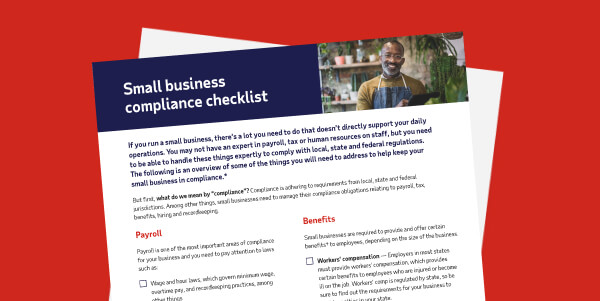Registration is one of the first steps in creating a company, but it may not be all that’s necessary to legally conduct business. Some state and local jurisdictions require operating licenses and depending on their business type, owners may need specialized permits. A restaurant, for example, generally needs a liquor license to sell alcoholic beverages. It’s essential for business owners to not only understand which licenses are required, but also how to maintain compliance.
Table of Contents
What is a business license?
A business license is permission from a federal, state or local government to engage in certain business activities, such as selling goods or providing services to the public. Many licenses must be renewed regularly or when certain events occur, such as a change in ownership or business structure. Failure to comply with ongoing requirements may result in costly fines and a damaged business reputation.
Do all organizations need a business license?
Whether a license is required generally depends on location and industry. For instance, an operating license is not necessary in every state and some industries are more regulated than others. Business owners should consult legal counsel to determine the specific licenses they need, if any.
Types of business licenses
There are many different types of business licenses. Some of the more common include, but are not limited to the following:
- Operating licenses
Some states and cities require organizations to have an operating license to conduct business in their jurisdiction. - Doing business as (DBA) licenses
Businesses that operate under a name other than their registered name may need a DBA license. - Zoning permits
Employers may need a zoning variance if their organization deviates from the types of businesses that a city or municipality allows in a certain area. - Building and occupation permits
Essential for obtaining business insurance, these licenses validate that a place of business meets building codes for structural integrity and safety. - Fire permits
Businesses that commonly use flammable or explosive materials may need a permit from the local fire department. - Health licenses
Proof that their business meets health codes is a must for some businesses, including those in the food and beverage industry. - Sign permits
Signage may have to meet certain size and placement regulations before it can be displayed. - Environmental licenses
If business operations will potentially impact water, air quality or other environmental concerns, an employer may need an environmental license. - Industry licenses
Licenses specific to a particular industry may be necessary in fields like construction, health care, pharmaceuticals and many more.
How to get a business license
Before acquiring licenses, it’s usually a good idea to first determine the business’s structure, e.g., limited liability company (LLC), corporation, etc., and apply for an employer identification number (EIN). Failure to do so may result in the need to amend or acquire new licenses at a later date.
With an EIN in hand, the process to obtain licenses typically requires the following steps:
- Determine which licenses are needed
This step can be research intensive. Business owners may have to consult with federal and state agencies, county administrators, secretaries of state, professional trade organizations and attorneys to find out which licenses are required. - Gather application documents
Variables, such as license type and industry, largely determine what goes into an application. Some examples of the information that may be required include:- Description of business operations
- Corporate bylaws, articles of incorporation or other business records
- Names of owners or registered agents
- Current state or local tax status
- Proof of business insurance
- Financial statements
- Filing fees paid to the government
- Submit the application forms
Whether mail, in-person, online or fax submissions are acceptable depends on the jurisdiction. Employers should check with their state, city or municipality for specific application policies. - Renew the license, if necessary
Some licenses have an expiration date. Staying on top of renewals can help prevent lapses in licensure and fines.
Where to get a business license
Licenses are obtained from federal, state and local governments. Due to the number of agencies that oversee business licensure at each of these levels, employers should obtain assistance from an attorney or third-party provider.
Federal licenses and permits
Businesses that conduct any of the following activities may need to apply for a license from a federal agency:
- Agriculture
- Alcoholic beverages
- Aviation
- Commercial fisheries
- Firearms, ammunitions and explosives
- Fish and wildlife
- Maritime transportation
- Mining and drilling
- Nuclear energy
- Radio and TV broadcasting
- Transportation and logistics
Business owners should check with the issuing agency for more information about license requirements and fees. A list of federal licensing agencies can be obtained from the Small Business Association.
State business licenses and permits
A wider range of activities may be regulated at the state level. Some examples include dry cleaning, retail, auctions and vending machines.
License requirements and fees vary by location. Employers will need to check with their state for specific details.
Frequently asked questions about business licenses
How much does a business license cost?
The cost of a business license may range from $50 to several hundred dollars, though actual prices depend on location and business activity or industry. There may also be renewal fees.
How long does it take to get a business license?
The licensing process can take days, weeks or even months. As with cost, location and industry greatly influence how long it takes to obtain a business license. Businesses in industries that are heavily regulated may have lengthier approval times than those that are not.
Which comes first, forming an LLC or obtaining a business license?
Owners usually determine the structure of their business, e.g., LLC, before obtaining licenses. This approach helps reduce costs because changes in name or business structure may necessitate new licenses and additional application fees.
This guide is intended to be used as a starting point in analyzing small business licenses and is not a comprehensive resource of requirements. It offers practical information concerning the subject matter and is provided with the understanding that ADP is not rendering legal or tax guidance or other professional services. Please consult with your legal counsel.






